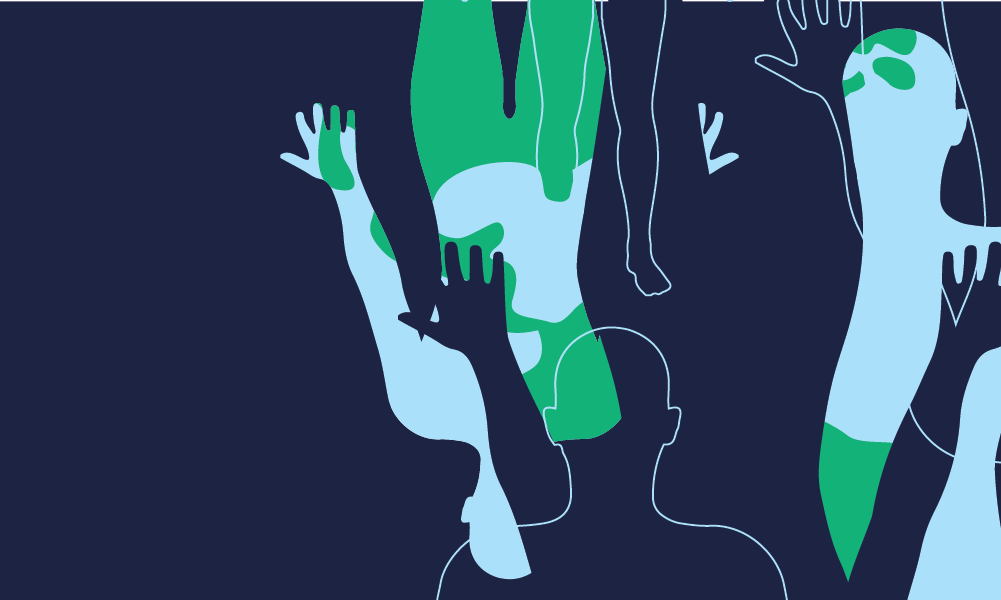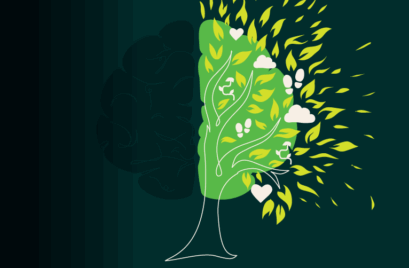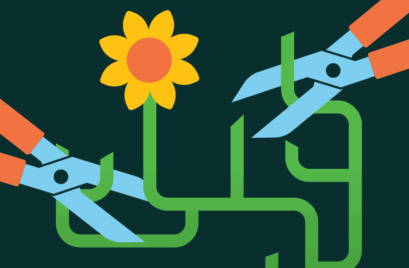
“The major problems in the world are the result of the difference between how nature works, and the way people think” – Gregory Bateson
The shift away from mechanistic thinking and old power paradigms into whole living-systems thinking has brought with it the rebirth of our relationship with the natural environment. We are appreciating that we do not live and work alongside, or separately from, the natural world, but are an integral part of it. Our interdependency with our greater ecosystem is not a discovery, but following industrialisation and the commodification of our lives, it is a perspective that we had, to a degree, misplaced.
Now, as we square our shoulders and face climate issues and the post-pandemic landscape, our global viewpoint is reconfiguring. We are wholeheartedly embracing whole living-systems thinking, knowing it is the only way we will survive and thrive. But this entails moving past sustainability measures to regenerative practices that will give back to the health of the living system we are inextricably bound to.
Us as Whole Systems Thinkers
Yet, while whole systems thinking is a positive, dynamic, and necessary paradigm shift to bring us back in touch with environment, it also brings with a tension. Knowing we are equal parts able to influence, and be influenced, can provoke both a sense of agency and helplessness. Our interdependency gives us a place and a role, but also leaves us vulnerable to the system’s movements. But by understanding how it works, we can better navigate our way.
Systems thinking rests on a number of component ideas that help to demystify its complex and holistic approach. These include:
- Interdependence – a system’s components are all interdependent
- Emergence – systems possess properties that organically evolve and are often hard to predict
- Entropy – the amount of disorder or randomness present in any system
- Feedback Loops – whole systems require constant feedback to function
- Order and priorities – whole systems are made up of smaller subsystems with intrinsic hierarchies that organically rank responses
- Differentiation – systems have components that perform specialized functions
- Convergence – means alternative ways of attaining the same objectives within systems
- Divergence – means attaining alternative objectives from the same inputs with systems
Using these concepts, we can begin to apply systems thinking to complex environmental questions and problems, such as how can our organisation positively contribute and make a difference to the health of our greater ecosystem.
Us as Natural Environment
At the core of our current reengagement with the natural environment is the belief that humans are just one part of a dynamic, web-like system called life. Any change we make affects the whole system, just as we are affected in turn by changes that flow across it.
There is no definitive starting place or linear progression to this kind of system. It is iterative and responsive. So, when we wish to deliberately influence change, we look for entry points rather than a singular starting point. For instance, fostering regenerative practices could occur within the home, on the street, in organisations, or at the global level. There is no “right” or “singular” point at which to begin to facilitate change. There can be multiple entry points, and though we can only imagine what the emergent effects from those small or large movements will be, we can be strategic in where we place our influence.
Many organisations are finding entry points into the question of how we keep our greater ecosystem healthy through regenerative agricultural practices. For example, General Mills US has launched a series of pilot programs that give farmers access to a regenerative agriculture assessment tool, which helps them align their own practices with universal regenerative principles. These multiple entry points are driving a large-scale movement with the goal to positively impact one million acres of farmland by 2050.
A much smaller movement with a different entry point is the farmer in Normandy, France, who has turned his farm into a forest garden. He champions the idea that multi-cropping and randomised planting better mimic the natural environment and provide far more growing resilience. On 1.8 hectares of land, he now produces approximately 800 varieties of vegetables, fruit, and herbs.
By realising that entry points can be divergent and convergent, we can begin to open our minds to how we can cascade change, beginning with a mindset that sees us as part of the natural ecosystem, rather than separate to it.
Us as our Organisational Environment
How we choose our entry points will be dictated by our mental models. Every day, we employ a way of thinking in order to operate. Our mental models are a unique blend of our values, assumptions, experience, education and they frame our decisions and actions. For us to enact change, we may require a perspective or paradigm shift from our current mental models. e.g., from the Earth is flat, to the Earth is a revolving sphere.
The amalgamation of our “individual” mental models affects how our organisation expresses and conducts itself. So, if we are seeking, for example, to improve our regenerative practices, challenging our ways of thinking may be our entry point. By building our capacity to think differently, we will begin to see opportunities that might previously have been invisible.
Thinking differently inevitably requires us to behave differently. This could mean elevating our partnering mindset, improving our sense and respond skills, or it could mean switching our focus from enhancing problem-solving abilities to championing potential, creativity, and innovation. It will also necessitate that we are more intentional in how we work and interact.
Like General Mills, forward thinking organisations such as Patagonia have already made the mindset leap and are enacting creative regenerative practices that are making an impact. Patagonia has developed a food offshoot company that offers ethically sourced products with a long shelf life. The idea is to rethink how we eat, as the food production accounts for 30% of global greenhouse gases.
Their initiatives are just some examples of organisational movements seeking better long-term outcomes for our natural living system and, as part of that, securing our own future. Whole living-systems thinking challenges us to open our minds in a constantly fluctuating landscape and then invites us to strategically consider where we can influence.
Part of that mindset reset sits in acknowledging that we are not powerless individuals, but system’s individual change agents. When the power of our agency blends with others, a movement is created, an energy builds, and a groundswell occurs that is felt the length and breadth of the system, altering its shape and circuitry. We can and do make a difference when we challenge our own thinking and purposefully thrum the eco-system’s web.
From – To Movements for Living-Whole Systems Thinkers
| FROM | TO |
| Optimising business/organisational efficiency | Optimising societal and environmental benefit |
| Analysis | Synthesis |
| What is happening | What do we want to happen |
| Problem-Solving | Potential |
| Habitual/Unthinking/Automaton | Intentional |
| Discrete/Siloed | Interdependent/Collaborative |
| Prescribed/Predictable | Emergent/Unpredictable |
Need More Help?
Keen to find out more about how to revolutionise your approach to whole systems thinking? Performance Frontiers help guide leaders and organisations look more deeply at the from and to movements needed to open minds in a constantly fluctuating landscape and consider where best to influence. Speak to us today about how we can partner with you to steward your organisation into a greater, more abundant future.







